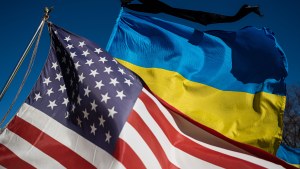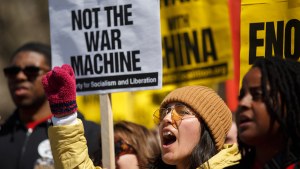Asian Americans Are True Internationalists

More so than any other racial or ethnic group, Asian, Native Hawaiian, and Pacific Islander Americans want the United States to play an active part in global affairs.
May marks Asian American and Pacific Islander (AAPI) Heritage Month in the United States, a time to honor the diverse culture and contributions of the AAPI community. The country’s fastest-growing racial or ethnic group, the AAPI population has roughly doubled over the past two decades and is expected to make up 9 percent of the total US population by 2060.
To better understand how these demographic changes may impact US foreign policy, we teamed up with the New America Foundation to conduct oversamples of different racial and ethnic minority groups in the 2022 Chicago Council Survey. It turns out that Asian, Native Hawaiian, and Pacific Islander Americans want the United States to be a key player on global issues—whether that be through diplomacy or military action.
Majority of Asian and Pacific Islander Americans Favor an Active US Role in World Affairs
Pivoting away from the isolationism of the Trump years, Joe Biden kicked off his presidency with a proclamation for the world: America is back. According to our 2022 survey, it’s a message that likely resonated with Asian Americans and White Americans, in particular. When asked whether it will be better for the future of the country if the United States takes an active part in global affairs, 65 percent of AAPI respondents answered yes—similar to White Americans but more than 10 percentage points higher than any other racial or ethnic group and above the national average.
Asian, Native Hawaiian, and Pacific Islander Americans further set themselves apart as the only racial or ethnic group other than White Americans (60%) to say they believe the benefits of global engagement outweigh the costs (60%). Fewer than half of Black (49%), Hispanic (48%), and Native Americans (38%) say the same.
Global Cooperation Is Top Priority
What do Asian Americans want US global engagement to look like in practice? The data suggest American leadership on global challenges, with 32 percent of AAPI survey respondents pointing to heading up international cooperation on world problems as their top foreign policy priority. While not far off from White Americans, 26 percent of whom expressed a similar opinion, this is a greater proportion than Black (18%), Native (15%), and Hispanic (19%) Americans.
Another three in 10 prioritize seeking economic gains for the US economy in global trade, higher than White (17%) and Black (24%) Americans and similar to both Hispanic (28%) and Native (33%) Americans.
Meanwhile, Asian, Native Hawaiian, and Pacific Islanders are less likely than other racial and ethnic groups to say the United States should focus most on issues related to US physical security. Just 17 percent name ensuring the physical defense of the country as their top foreign policy priority, compared to a third of White and Native Americans (34% and 33%, respectively) and roughly a fourth of Black and Hispanic Americans (25% and 21%).
Asian and Pacific Islander Americans More Comfortable with Boots on the Ground
Although Asian Americans may not rank defense highly on their list of foreign policy priorities, that’s not to say they oppose the use of force. AAPI respondents to our 2022 survey were the most likely of any racial or ethnic community to support sending American troops abroad in nearly all scenarios presented, including if North Korea were to invade South Korea (61%); to help Ukraine defend itself against Russia’s invasion (60%); and to combat terrorist groups in Somalia (53%).
Most notably, they were the only demographic group in favor of deploying US forces to aid Taiwan if China were to invade the island (55%). While this result may be attributable to security concerns—more than half of Asian Americans identify Beijing’s territorial ambitions as a critical threat to the United States (51%)—they are not the only racial or ethnic community to express this view; about half of White (53%), Black (48%), Native (52%), and Hispanic (54%) Americans say the same. Regional or familial ties could be another factor, but more research is needed to fully understand AAPI beliefs on this subject.
More Demographic Deep Dives Coming Soon
This is the second of many analyses coming from the Chicago Council Survey team examining racial and ethnic minority groups’ views of US foreign policy this year. Stay tuned, and sign up for our biweekly newsletter, Foreign Policy Matters, for the latest updates!


Related Content
 US Foreign Policy
US Foreign Policy
Black Americans are supportive of aid to Ukraine, but less likely than other Americans to back an open-ended support of Kyiv “for as long as it takes.”
 Public Opinion
Public Opinion
On some of the most significant issues of the day, including how the United States should respond to Russia's invasion of Ukraine, Americans across party lines are in agreement, albeit often for different reasons.
 Public Opinion
Public Opinion
Both Millennials and Gen Z are more hesitant than their elders to endorse military approaches to foreign policy.